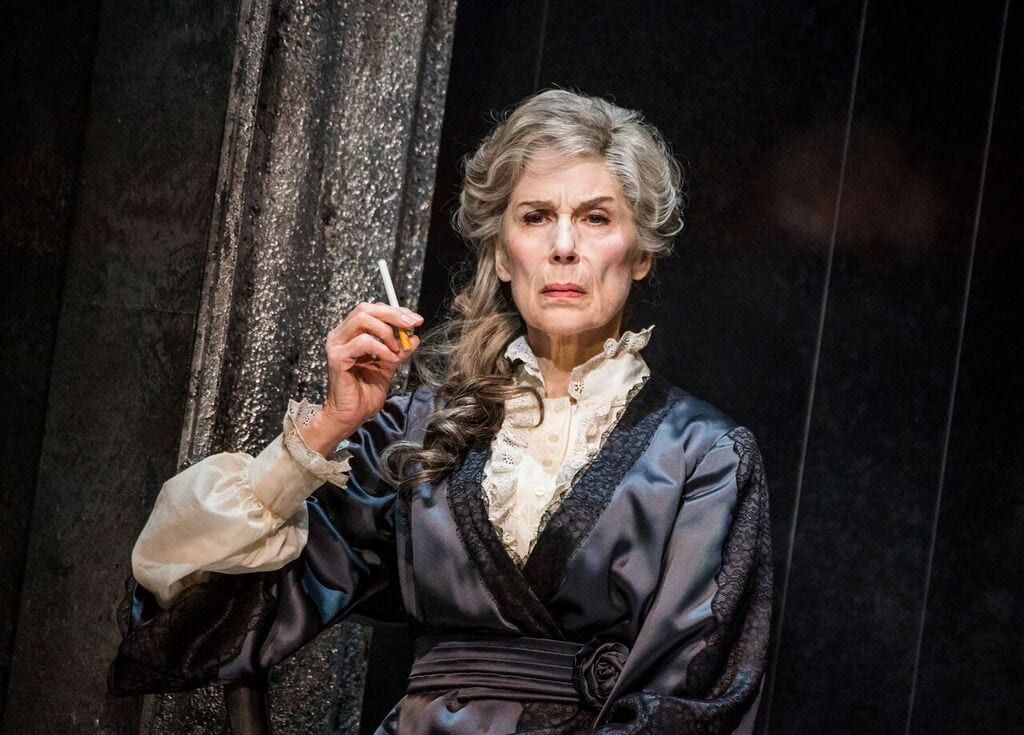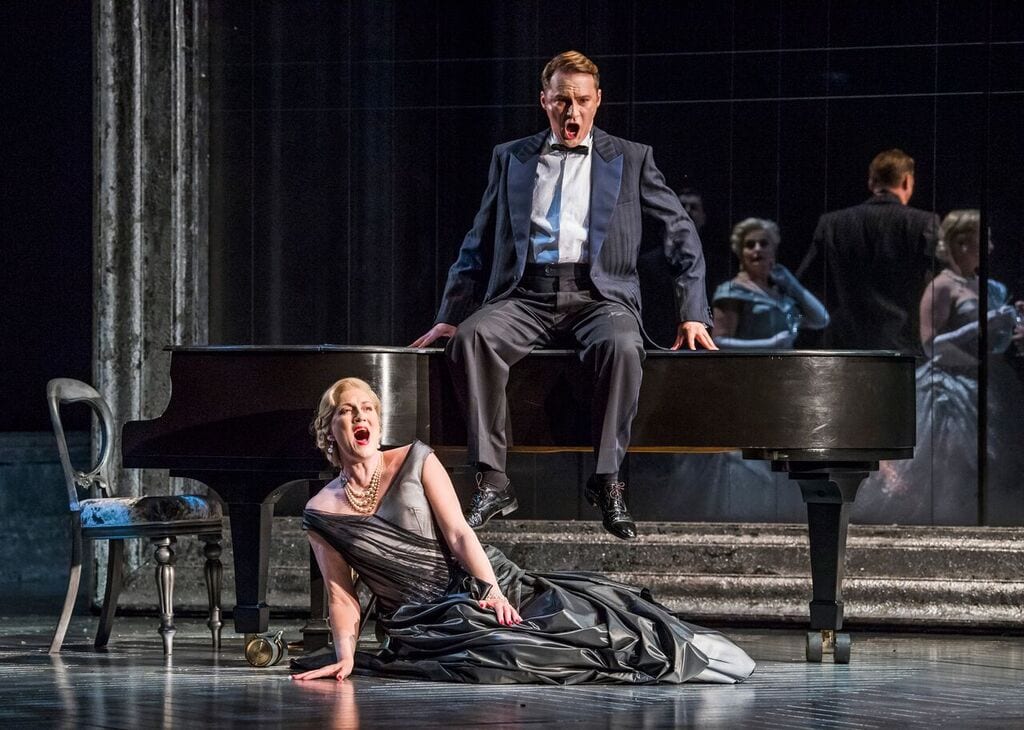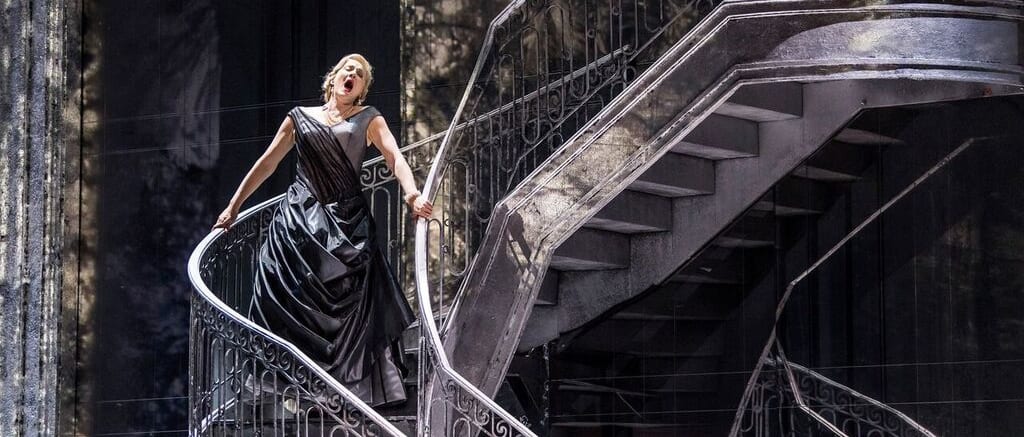Samuel Barber’s Vanessa (1958) is a work at once accessible and elusive, and a successful production revolves around breaking down that paradox and revealing a clear, concrete dramatic meaning. This Keith Warner does so with great success in the final production to appear at this year’s Glyndebourne. It is hard to see how this awkward work could be better opened out to new audiences, and it receives a performance of searingly intense commitment from the principals in a carefully referenced historical setting of ‘film noir’ elegance.
It is essentially the story of three women spread out across three generations. They may be the same woman at different points in her life, as in Edward Albee’s Three Tall Women, or they may be oedipally linked (the interpretation strongly suggested here); but all are in a condition of waiting and expectation, with the shade of Chekhov at their collective elbow. Vanessa (Emma Bell) was abandoned by her lover Anatol and lives in a rural fastness with her niece and mother awaiting his return. Erika (Virginie Verrez), who may be Vanessa’s daughter, shares Vanessa’s romantic ardour but possesses a more hard-headed concept of love’s possibilities, and her grandmother, the Old Baroness, (Rosalind Plowright) haunts the action in her own world of regrets, only speaking to those who are not living a lie – which is not many in this household.

When Anatol arrives he turns out to be his chancer of a son, and not the father. Erika falls for him and into pregnancy, and Vanessa too cannot resist his superficial charm. Within this gothic framework a great deal of psychological subtlety is all the same conveyed. Much of the music revolves around the exposition of different kinds of romantic sensibility and possibility, as the women tussle with themselves and each other, and what love can ever actually mean. All the characters are given opportunities to explore hopes, fantasies, and ultimately harder, more realistic choices that revolve around the core sentiment that ‘the love we find is not the love we dream of…’ At the end, everything and nothing has changed, as Vanessa and Anatol depart for Paris and Erika closes up the house around herself and begins to wait in turn. There is little hope that any party will be satisfied for long, though in a final quintet of ineffable beauty, the production suspends that doubt exquisitely in the way that only opera can.
Warner and his designer Ashley Martin-Davis have set this darkly puzzling abstract tale in the period of the opera’s creation. The grand house is suggested through a slalom of huge silver-framed mirrored walls and a spiral staircase, which shift position to convey both vast spaces and emotional claustrophobia. Costumes add sober tints of white, silver, black, and grey and at points projections open out the story into a snowy landscape beyond. A fine sense of tonal congruity is conveyed without specifying a location.

Jakub Hruša ensures the London Philharmonic Orchestra explore a wide dynamic range of expression that evokes the hints of Bartok and Strauss in the scoring especially in the several long orchestral interludes. Above the seething sounds in the pit, all the principals soar in rhapsodic monologues and duets and memorable squabbles. Bell has the aristocratic command and vulnerability needed to project the title role, though in the less convincing second act the part does not really develop significantly, and it is harder for her to retain psychological credibility. Verrez is simply sensational as Erika, dominating every scene she is in and projecting the pain of her character with fearless vocal abandon while registering the gentler moments too. Plowright has turned the grand dowager into an art form of its own in recent years, but here she scores just as much with her subtle acting off the speech as in her interventions.
Anatol is an ungrateful, deliberately two-dimensional role, but Edgaras Montvidas has the vocal heft required for it, as well as the debonair surface manner that suggests flashy unreliability. He is well contrasted with the genuine, homespun charm of Donnie Ray Albert as the old doctor and family friend. He is something of a chorus figure, adding some important and needed comic moments with a fresh, friendly outsider’s viewpoint on this strange family. Minor roles are taken discreetly and impeccably.
A wintry melodrama may seem strange fare for a summer night in Sussex, but this production succeeds as the best Glyndebourne productions do, in taking you into its own rare world, holding up truths for inspection both beautiful and uncomfortable, before sending you out again into the twilight with much food for thought.

